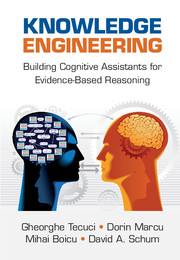Book contents
- Frontmatter
- Contents
- Preface
- Acknowledgments
- About the Authors
- 1 Introduction
- 2 Evidence-based Reasoning: Connecting the Dots
- 3 Methodologies and Tools for Agent Design and Development
- 4 Modeling the Problem-Solving Process
- 5 Ontologies
- 6 Ontology Design and Development
- 7 Reasoning with Ontologies and Rules
- 8 Learning for Knowledge-based Agents
- 9 Rule Learning
- 10 Rule Refinement
- 11 Abstraction of Reasoning
- 12 Disciple Agents
- 13 Design Principles for Cognitive Assistants
- References
- Appendixes
- Index
13 - Design Principles for Cognitive Assistants
Published online by Cambridge University Press: 05 September 2016
- Frontmatter
- Contents
- Preface
- Acknowledgments
- About the Authors
- 1 Introduction
- 2 Evidence-based Reasoning: Connecting the Dots
- 3 Methodologies and Tools for Agent Design and Development
- 4 Modeling the Problem-Solving Process
- 5 Ontologies
- 6 Ontology Design and Development
- 7 Reasoning with Ontologies and Rules
- 8 Learning for Knowledge-based Agents
- 9 Rule Learning
- 10 Rule Refinement
- 11 Abstraction of Reasoning
- 12 Disciple Agents
- 13 Design Principles for Cognitive Assistants
- References
- Appendixes
- Index
Summary
This book has presented an advanced approach to developing personal cognitive assistants. Although the emphasis in this book has been on cognitive assistants for evidence-based hypothesis analysis, the Disciple approach is also applicable to other types of tasks, as was illustrated by the agents presented in Chapter 12. Moreover, the Disciple approach illustrates the application of several design principles that are useful in the development of cognitive assistants in general. In this chapter, we review these principles, which have been illustrated throughout this book. Each of the following sections starts with the formulation of a principle and continues with its illustration by referring back to previous sections of the book.
LEARNING-BASED KNOWLEDGE ENGINEERING
Employ learning technology to simplify and automate the knowledge engineering process.
It is generally accepted that knowledge engineering is very difficult, involving many creative tasks. One way to simplify this process significantly is to automate as much of the knowledge engineering process as possible. As discussed in Section 3.3.6, the approach taken with Disciple is to replace each knowledge base development activity of the knowledge engineer (e.g., modeling the problem-solving process, ontology development, rule learning, rule refinement) with an equivalent activity that can be performed directly by a subject matter expert and the Disciple agent, with limited or no support from the knowledge engineer (see Figure 3.19, p. 107).
Consider, for example, the modeling of the problem-solving process. A knowledge engineer would need to instruct a subject matter expert how to express his or her reasoning in the divide-and-conquer analysis and synthesis framework. Then the expert and the agent can model the solutions of new problems by themselves. In this process, the agent will support the expert in various ways. For example, the agent may employ previously learned rules to suggest likely reductions of the current problem or hypothesis. Or it may learn and reuse reasoning patterns to suggest reductions to the expert.
Now consider the development and testing of the reasoning rules, which the knowledge engineer does through interviews with the subject matter expert, as discussed in Section 3.1.4. This time-consuming and error-prone task is reduced to several tasks that the subject matter expert and the Disciple agent can easily perform, as discussed in Sections 9.4 and 10.1.2.
- Type
- Chapter
- Information
- Knowledge EngineeringBuilding Cognitive Assistants for Evidence-based Reasoning, pp. 426 - 432Publisher: Cambridge University PressPrint publication year: 2016

